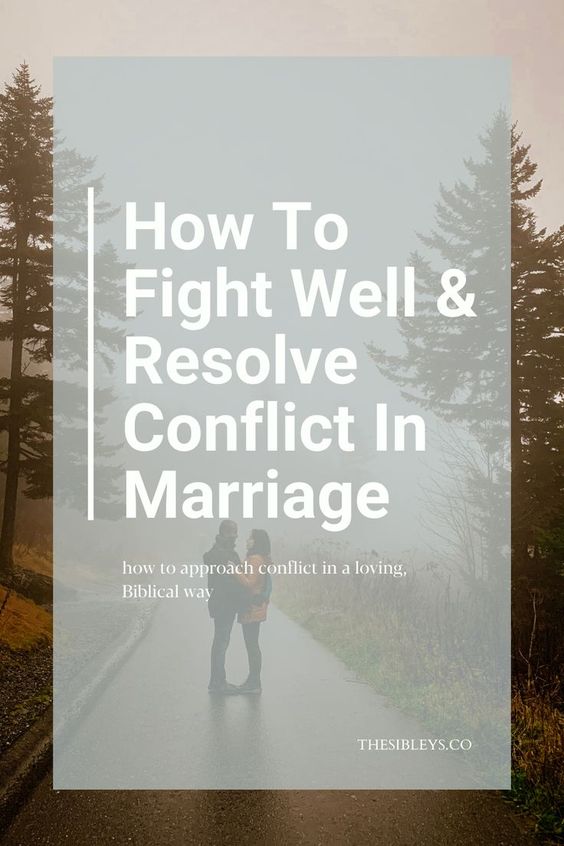What’s the number one cause of conflict in marriage? What are practical ways to prevent conflict with the one we love? And when that conflict inevitably comes at some point, how do we resolve it in a loving, biblical way?
In this episode, we chat about all of these questions (and even discuss some of our own fights).
The Difference Between Fights and Disagreements
Disagreements are good and natural- we don’t all want to be the exact same person. For example, some basketball fans love Duke and some love Carolina (if you’re from North Carolina, you’ll know exactly what we’re talking about). You can disagree over what your favorite color is. Or to make it more applicable to this conversation- we can disagree over the best parenting methods without fighting about it and still come to an agreement.
Fighting can get a bad rap, but there are ways to fight well. If we want to glorify God in everything we do, how can we glorify God in the way we disagree?
Conflict in Marriage
Conflict is inevitable, and if conflict isn’t happening in a marriage, one of the spouses likely isn’t speaking up or doesn’t have the freedom to do so. You are two different and sinful humans, so regardless of how similar or sanctified you are, there will be some form of conflict.
There are two general ways of handling conflict. One end of the spectrum is a “ragey”, “knock-down” type of fight, where you throw barbs at each other. It is a very aggressive, angry form of conflict “resolution.” The complete opposite end of the spectrum is passive avoidance. One or both spouses are not being honest and are fleeing conflict and brushing it under the rug. If you fall in this camp, you might be thinking that if you avoid conflict you’re making your spouse happier or you doubt anything will change.
But maybe, if our relationships and marriages are built on honesty and open conversations and not shying away from them, and cultivating and learning these skills, we can grow and train ourselves to have healthier God-honoring marriages. You’re on the same page and you’re on the same team, so you aren’t seeking to defeat your teammate.
How Conflict Starts
Typically, conflict starts because of one of these four things:
- Miscommunication: this can be over the little things and the big things!
- Unmet Expectations: these expectations often stem from miscommunication and they turn into demands and someone feels personally slighted.
- Mistakes: they happen!
- Stress: this can be over money, lack of sleep, parenting, physical health, work, etc…
Practical Ways to Prevent Conflict
In order to prevent miscommunication and unmet expectations, we need to be really proactive about staying on the same page with our spouses. Not only does this help us avoid conflict, but it also helps us have something that our marriages are shooting for and gives us direction.
Practically, we have a weekly marriage meeting to help us stay on the same page. Check out Episode No. 2 for a more detailed dive into this weekly meeting. One of the questions we ask is, “what expectations do you have of me this week?” If we don’t honestly answer these questions (and ask them), there is no way for us to know what our spouse’s expectations are of us.
Another way we try to prevent conflict in our marriage is by trying to have a clear vision of where our family is going in the season that we’re in. This is what we call our Family Gameplan. We want a clear idea of what we’re working towards, valuing, and prioritizing in this season.
It requires an investment of time and discussion to prevent conflict. If you’re failing to plan, you’re planning to fail.
How do we handle conflict when it does arise?
Like we said earlier, conflict is inevitable, so there are some important things to remember once conflict does arise.
Unless you are in a really unhealthy relationship, it’s important to remember that your spouse is not out to get you or ruin your day. This reminder helps you have an abundance of grace towards one another. Remember that Jesus said we are to forgive abundantly in Matthew 18:21-22! When it comes to conflict with your spouse, enter into it with a heart of reconciliation and remember that the goal is forgiveness.
Practically, this is the biggest thing we have implemented in our marriage in the past year: As soon as one of us senses that conflict is arising, whoever is “cooler-headed” in the moment, stops, and we pray out loud together. We pray that we glorify God in our disagreement. This moment spent in prayer tends to slow down any tension that has been rearing up.
As soon as we finish praying, we affirm to each other that we are on the same team. There is power in words- this reiterates and reassures and can be really comforting.
Next, we ask each other, “what is the biggest issue for you right now?” Generally speaking, in conflicts, each spouse has something that is the driving frustration, and often, they are very different. Take these issues one by one and talk through them. These issues may not seem like a big deal, but taking the time to flesh them out can bring a lot of understanding. This also helps you avoid getting bogged down in the minor details and not ever getting to the root of the conflict.
Once you start getting into these issues, fight the urge to be defensive. Let one person talk without interruption. Allow each other to really flesh out and give their whole thought process. It can be difficult to do this, but you need to apologize where necessary.
Finally, you need to review. When you have your weekly meetings, review how your conflict was handled over the past week. Debriefing helps to reinforce those practical steps to both prevent conflict and handle it well.
A Note to Husbands
Nathaniel really challenges husbands to lead their families and marriages well by taking the initiative to handle conflict well.
Ephesians 5:25 says “Husbands, love your wives, as Christ loved the church and gave himself up for her.” Men need to recognize that in this passage, we are being compared to Christ. Philippians 2 gives us a picture of how Jesus led and loves his church. Even though He is God, he took the form of a servant, humbled himself, and died on the cross. This is the image of what a Christian husband should be.
From Nathaniel: “Husbands, we should be the ones who are stopping the conflict to pray. We should be allowing our wives the be the first to speak and not interrupt them. We should be the first to apologize and lay down our little, perceived slights.”

One Degree Shift
Whenever conflict arises in your marriage, one of you should stop and pray and remind each other that you are on the same team.
*To take it a step further: ask each other “what is your biggest issue right now?” after you pray.
Leave a Review
If you’re loving this podcast, we’d be so grateful if you took a minute to leave us a review!
Want to continue learning from us?
- Take the spouse evaluation with your spouse to kickstart growth in your communication and intentionality in marriage: Are You and Your Spouse on the Same Page?
- Listen to another helpful podcast episode: Establishing Healthy Rhythms for Couples + Families
- Download: Guide to Your Weekly Marriage Meeting to start being intentional with your weekly communication today
- Subscribe to our weekly newsletter, where we deliver encouragement and exclusive tips to your inbox once a week
- Follow along on Instagram for even more education, news, and fun


+ show Comments
- Hide Comments
add a comment